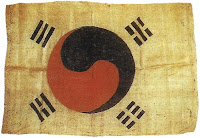A few political changes can do a great deal in changing the way of seeing the country. What follows is the chapter on Final Remarks :
We have already mentioned the fact that there are many different religions in Korea. Each one of these makes more or less vigorous efforts to influence the minds of the people.
Buddhism and Shintoism are especially protected by the government. They are official religions. The government also protects and favors Confucianism. Then there are the Heavenly Teachers, the Heavenly Guard, the Religion of Tankoun, etc., etc. These latter claiming to be purely Korean and therefore, the only really national faiths. Owing to this claim they win many followers. These followers are also attracted by the semi-political, semi-religious dreams of these sects and by the mystery in which several of them shroud their ceremonies and their true aim.
In speaking of all these religions, we also drew attention to the particular influence which this confused mixture of heterogeneous beliefs has had on the soul of the Korean. He has been led to develop a species of religious eclecticism. Nothing counts except exterior ceremonies, As for beliefs, there is no reason why they should not vary according to individual taste and to circumstances. The final result of this in some instances, practically amounts to atheism.
It is not difficult for Koreans having this kind of a mentality to show tolerance: one religion is as good as another in their opinion. If anyone argues with them, and especially if that person be a foreigner, they will reply; "Let each one follow the religion which appeals to him most." But in the bottom of their hearts, they have a leaning towards one of the religions of their own country, because it is a national religion. They have no objections to observing the ceremonies of several of these religions, even if the religions teach opposite doctrines. Such contradictions do not trouble them at all.
Sometimes Koreans admire the beauties of Catholic dogma and of the Church's moral teachings. He even expresses a more or less genuine desire to become a member of this religion which promises so much. But he is amazed when he learns what sacrifices he must make in order to remodel his life in conformity with the Divine precepts. He must abandon his idle superstitions, and, above all, he can no longer worship his ancestors. If the grace of God has not taken full possession of him, he will find it impossible to follow a religion which excludes all else. The Catholic religion will appear to him as rigid and narrow. This is the first obstacle that Catholicism meets with in Korea.
The second is the materialism, which has followed in the wake of the new civilization. It is useless to describe the materialism. This civilisation has produced the same fruits everywhere it has penetrated. It is hardly surprising that a nation which, until recent years, had practically no intercourse with foreigners should be easily captivated by the material aspect alone of modern culture. For such a nation, this brilliant aspect is the only one of any importance. It fascinates and attracts. Korea has not any principles in itself by means of which this attraction can be overcome.
At the present time, a wave of socialism and Bolshevism has swept over the peninsula. These ideas have bet with special success in Korea, for the Koreans love something new.






















.jpg)